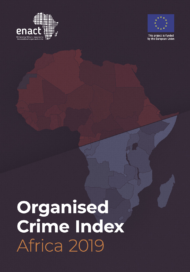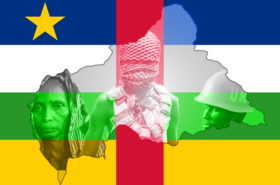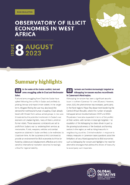Posted on 26 Feb 2020
In the Central African Republic, shadowy trade continues to fuel protracted violence and human-rights abuses, according to a recent UN Security Council report.
In the Central African Republic (CAR), the impact of illicit flows is particularly severe. Recognizing this, the UN Security Council (UNSC) continues to direct efforts at understanding how illicit flows drive the ongoing conflict.
On 31
January, the UNSC, through Resolution 2507, renewed its arms embargo for the
CAR and extended the mandate of its Panel of Experts. The panel assists the
Sanctions Committee in carrying out its work and monitoring the situation on
the ground.
A peace
accord was signed in February 2019 by no fewer than 14 armed groups and the
government. Nevertheless, fighting has continued across the country and many of
the conflict dynamics remain unresolved. At the national level, a cabinet
representing all 14 armed groups was formed. Yet, across the country, gross violations
of humanitarian law continue, including attacks on civilians, sexual violence and
unlawful detention. The UN Office for the Coordination of Humanitarian Affairs
(OCHA) estimates that approximately 2.6 million
people, over half of the population, will need humanitarian assistance in 2020.
In this conflict, illicit economies and smuggling activities sustain armed groups,
and allow arms and ammunition to flow in the country – increasing opportunities
for violent clashes.
CAR ranks among
the highest in Africa for its level of criminal markets (third out of 54
African states, and almost the lowest on the continent (52 out of 54) in terms
of resilience to criminal activity, according to data analyzed in the Organized Crime Index Africa 2019, a multidimensional tool that
measures both the level of countries’ criminal markets and their resilience to
organized crime. For the CAR, the Index provides a complex picture of
overlapping criminal markets, including pervasive illicit natural-resource
extraction, arms trafficking, human trafficking, illegal logging and poaching –
activities that are carried out by local and foreign actors alike. The ongoing
conflict, weak governance and extreme vulnerability to shocks as one of the ‘Least
Developed Countries,’ as classified by the UN, make CAR’s ability to combat
crime among the lowest on the continent.
In its latest
resolution on CAR, the UNSC again tasked the expert panel with researching ‘transnational
trafficking networks which help fund and supply armed groups in CAR’.
When establishing
the current sanctions regime in 2013, the Council stated that measures could be
taken against armed groups or criminal networks that fuel violence through the
illicit exploitation of natural resources, such as diamonds. For instance, in
August 2015, the Council sanctioned Badica, one of the largest diamond
companies in CAR, together with Kardiam, its branch in Antwerp, Belgium for ‘providing
support for armed groups or criminal networks through the illicit exploitation
or trade of natural resources, including diamonds, gold, as well as wildlife
and wildlife products, in the CAR’. It has also applied these criteria to
individuals on the sanctions list, such as a Séléka general involved in the illicit diamond
trade from Bria and Sam Ouandja, in the eastern region of CAR, to Sudan.
Regional
cooperation is critical to addressing the transnational nature of how armed
groups finance their activities and maintain territorial control. CAR is
situated between several countries that also have UNSC-imposed sanctions
regimes – the Democratic Republic of Congo (DRC), Sudan and South Sudan. Chad,
to the north, is a member of the Group of Five Sahel joint force (G5 Sahel),
which coordinates with UN missions in the region to combat terrorism and
criminal groups.
In
September last year, the Council encouraged authorities in CAR and neighbouring
states to work together to investigate and combat transnational criminal
networks and armed groups involved in arms trafficking. It specifically encouraged
‘the reactivation of joint bilateral commissions between the CAR and
neighbouring states’, as CAR has done with Cameroon and the Republic of the
Congo.
In renewing
the expert panel’s mandate, the Council also re-authorized cooperation between
the CAR panel and other panels and groups of experts in its analysis of
transnational trafficking networks. In a country where a majority of the
territory is controlled by armed groups – and each region presents a different
cocktail of natural-resource exploitation, illicit arms flows, criminal
entrepreneurs, local communities and cross-border trafficking – sharing
analysis is essential to develop a full picture of regional trafficking
dynamics and their implications across conflict situations.
The panel’s
recent report from December 2019 includes
in-depth analysis of the pervasive ways in which cross-border smuggling impacts
the conflict. In the north and east of the country, armed groups profit from
illicit gold and diamond mining, through engaging in the business as well as illegal
taxation of all those involved in the supply chain. Along these borders, most of
these minerals are smuggled to Chad and some then to Cameroon.
Along the
border between CAR and the DRC, armed groups and criminal entrepreneurs trade hunting
ammunition and weapons for gold and precious minerals. The weapons reinforce the
militants’ ability to generate income from the illegal mining, making the
smuggling ‘essential’ to the survival of Anti-balaka and UPC (Union for Peace
in CAR) groups operating in the region. In turn, these actors fight over
control of weapons entry points and mining areas.
In December,
35 people died in Bangui (the CAR capital, situated close to the DRC border) in
a clash between an armed group and
merchants, as the latter refused to pay taxation demanded
by the group. Along the border with Sudan, similar dynamics play out, where
Sudanese middlemen sell hunting ammunition and guns to armed groups across the border.
In one situation, a conflict over the import of
ammunition from Sudan led to direct fighting between two groups and resulted in
the deaths of fighters and traders.
Although there are more than a dozen armed groups battling for territorial control across the country, the cross-border trade that fuels the conflict is consistent throughout. Information-sharing between the CAR expert panel and other UN fact-finding missions (such as the Group of Experts in DRC and the Panel of Experts for Sudan and South Sudan) will allow for a more comprehensive picture of the shadowy trade that continues to fuel this conflict and the related human-rights abuses and humanitarian crisis. Resolving the conflict in a sustainable way can occur only if the illicit flows that pervade the country are addressed, making CAR a critical place for understanding and responding to illicit flows.
Photo: UN Photo/Eskinder Debebe – Bangui, Central African Republic



